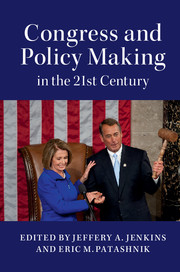Book contents
- Frontmatter
- Contents
- List of Figures
- List of Tables
- List of Contributors
- Acknowledgments
- 1 The Evolving Textbook Congress: Polarization and Policy Making on Capitol Hill in the 21st Century
- PART I CONGRESSIONAL POLICY MAKING IN A POLARIZED AGE
- PART II CONGRESS AND SOCIETY
- PART III CONGRESS AND ECONOMIC POLICY
- PART IV CONGRESS AND DOMESTIC POLICY DILEMMAS
- 9 The $40 Trillion Question: Can Congress Control Health Care Spending?
- 10 The Demise of Immigration Reform: Policy-Making Barriers under Unified and Divided Government
- 11 It's Hard to Get Mileage Out of Congress: Struggling Over CAFE Standards, 1973–2013
- PART V REFLECTIONS
- Index
- References
11 - It's Hard to Get Mileage Out of Congress: Struggling Over CAFE Standards, 1973–2013
from PART IV - CONGRESS AND DOMESTIC POLICY DILEMMAS
Published online by Cambridge University Press: 05 February 2016
- Frontmatter
- Contents
- List of Figures
- List of Tables
- List of Contributors
- Acknowledgments
- 1 The Evolving Textbook Congress: Polarization and Policy Making on Capitol Hill in the 21st Century
- PART I CONGRESSIONAL POLICY MAKING IN A POLARIZED AGE
- PART II CONGRESS AND SOCIETY
- PART III CONGRESS AND ECONOMIC POLICY
- PART IV CONGRESS AND DOMESTIC POLICY DILEMMAS
- 9 The $40 Trillion Question: Can Congress Control Health Care Spending?
- 10 The Demise of Immigration Reform: Policy-Making Barriers under Unified and Divided Government
- 11 It's Hard to Get Mileage Out of Congress: Struggling Over CAFE Standards, 1973–2013
- PART V REFLECTIONS
- Index
- References
Summary
This chapter is part of a broader effort to analyze U.S. legislative efforts to develop energy policy from the oil embargo of 1973 to 2013. For four decades, there was general agreement on the overall long-term policy goal of making the United States less dependent on foreign sources of energy. Every president from Nixon to Obama and every Congress has articulated some version of an energy independence goal, regardless of which party was in the majority or whether party control at the national government level was unified or divided. What decision makers did not agree upon were the policies needed to reach that goal. It would not be too much of a simplification to say that policy makers, interest groups, and the public were largely split into two camps. One viewed the solution largely in terms of increasing production of fossil fuels to meet the growing energy demand, while the other preferred lowering demand through conservation and less reliance on fossil fuels. Until the last few years, when a sluggish economy slowed energy demand and some major technological breakthroughs have significantly increased domestic oil and gas production, U.S. reliance on foreign energy had remained at or above the level at the time of the Organization of the Petroleum Exporting Countries (OPEC) embargo. Even if one believes that dependence would have been much greater if it were not for the policies that were adopted, one could reasonably contend that U.S. energy policy was an example of policy failure.
In the description, analysis, and theorizing that follow, I will examine the legislative struggle over one policy option in the effort to enact and implement an overall energy policy, the use and adjustment of CAFE (corporate average fuel economy) standards on motor vehicles, particularly on automobiles and light trucks. In doing so, I hope to provide some explanations for why energy policy posed such difficulty for Congress and a series of presidential administrations for most of forty years. I will contend that as the hurdles to enacting legislation grew, there has been a decline in congressional policy influence, not just on energy policy, but more broadly as presidents choose to bypass Congress in pursuing their policy goals. In doing so, my findings are generally supportive of and extend the ideas that Terry Moe and William Howell (1999) set forth on presidential exercise of unilateral action.
- Type
- Chapter
- Information
- Congress and Policy Making in the 21st Century , pp. 272 - 298Publisher: Cambridge University PressPrint publication year: 2016



